 |
|
| |
| Tackling Polio Resurgence |
| |
The emergence of as many as six polio cases since April in North Waziristan district, after a hiatus of 15 months, has poured cold water over hopes of Pakistan being, in the words of Unicef officials, “closest to the finish line”. While the cases in themselves are cause for alarm, they also reflect the damaging impact Covid-19 has had on routine and targeted vaccination campaigns against a number of infectious diseases, including polio. 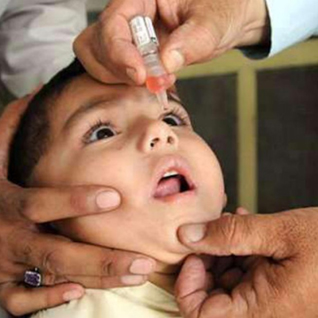 Moreover, the strong resurgence of the virus in a high-risk area also indicates that several systemic issues have persisted, despite efforts to correct them. It appears that Pakistan’s robust handling of the pandemic came at a high cost to anti-polio efforts. Some experts say that significantly fewer vaccination campaigns, and the use of the polio infrastructure for Covid-19 reporting, led to reduced vigilance in high-risk polio areas, including North Waziristan. All children confirmed with wild polio this year belong to North Waziristan, where more cases are expected due to high refusal rates and instances of finger-marking without vaccination during campaigns.“The Pakistan Polio Programme has conducted emergency campaigns in the area, while children are administered the vaccine at all entry and exit points from southern KP to control the spread of the virus. The programme is working relentlessly to control the spread of wild polio, but we need the support of parents and caregivers to succeed in our mission of a polio-free Pakistan. The only two endemic countries in the world, Pakistan and Afghanistan, synchronized immunization campaigns from May 23 to May 27, vaccinating millions of children on both sides of the border. Moreover, the strong resurgence of the virus in a high-risk area also indicates that several systemic issues have persisted, despite efforts to correct them. It appears that Pakistan’s robust handling of the pandemic came at a high cost to anti-polio efforts. Some experts say that significantly fewer vaccination campaigns, and the use of the polio infrastructure for Covid-19 reporting, led to reduced vigilance in high-risk polio areas, including North Waziristan. All children confirmed with wild polio this year belong to North Waziristan, where more cases are expected due to high refusal rates and instances of finger-marking without vaccination during campaigns.“The Pakistan Polio Programme has conducted emergency campaigns in the area, while children are administered the vaccine at all entry and exit points from southern KP to control the spread of the virus. The programme is working relentlessly to control the spread of wild polio, but we need the support of parents and caregivers to succeed in our mission of a polio-free Pakistan. The only two endemic countries in the world, Pakistan and Afghanistan, synchronized immunization campaigns from May 23 to May 27, vaccinating millions of children on both sides of the border. |
| |
|
|
| KP Assembly Passes Bill |
| |
The Khyber Pakhtunkhwa Assembly passed the much-delayed provincial Child Protection and Welfare (Amendment) Bill, 2022,In response to several high-profile cases of child abuse, the Khyber Pakhtunkhwa Assembly has passed an amendment act to the Child Protection and Welfare Act 2010, making the existing punishments for crimes against children, including sexual abuse, pornography, organ trade and trafficking, more stringent.
The bill has been passed after much delay. The law faced a deadlock even before it was introduced on the floor of the assembly, at the cabinet stage when there was a controversy over a clause for publicly releasing video recordings of the execution of the convicts of sexual assault against children. That clause was removed after several legislators drew attention to the fact that it may be in contradiction with the UN convention on human rights.
 The new law makes several important changes; it extends the punishment for involvement in child pornography to 14 and 20 years, with a fine between two and seven million rupees, whereas in the original law, the punishment was three-seven years imprisonment and a fine of Rs200,000-Rs500,000. This way, the punishment for several crimes, including the seduction of a child, child trafficking and sexual abuse, has been increased twofold, and in some crimes, carries life imprisonment. The new law also mandates the Police to now maintain a register of sexual offenders, which shall contain the names of convicted persons. The new law makes several important changes; it extends the punishment for involvement in child pornography to 14 and 20 years, with a fine between two and seven million rupees, whereas in the original law, the punishment was three-seven years imprisonment and a fine of Rs200,000-Rs500,000. This way, the punishment for several crimes, including the seduction of a child, child trafficking and sexual abuse, has been increased twofold, and in some crimes, carries life imprisonment. The new law also mandates the Police to now maintain a register of sexual offenders, which shall contain the names of convicted persons.
There is absolutely no doubt about the fact that child protection laws needed to be updated. While expanding the punishments was necessary, this is not enough and the provincial assembly needs to also look into amendments that address the loopholes that exist in implementation.
|
|
| |
|
|
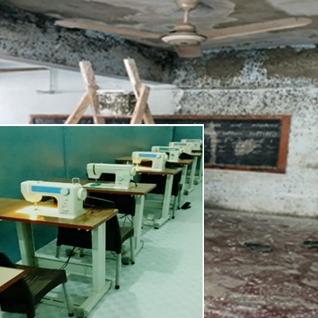 |
|
| |
| School Renovation &Vocational Training Centers |
| |
SPARC with the support of Terre des hommes and BMZ is upgrading basic infrastructure of project schools. Trained teachers, and SMC played vital role in preparing school development plan. Furthermore Vocational Centers for women were established in Machar Colony Karachi. Each center will offer Beautician and Stitching courses. Project team is intended to conduct market analyses. |
| |
|
|
| |
| Vocational Training |
| |
Stitching and tailoring skills being given to women and girls at SPARC vocational center Mehr Abadi. Young girls and women prepare stuff for exhibition and selling. The center intends to empower them for a decent 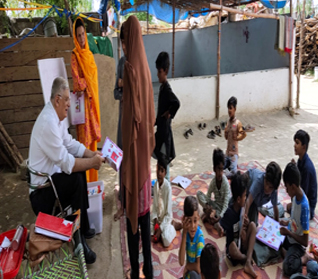 earning. 48 females were given skills in the month of May. Non –formal education and skill training is given at different Sparc centers (Hyderabad, Peshawar. Rawalpindi, Multan, Islamabad). earning. 48 females were given skills in the month of May. Non –formal education and skill training is given at different Sparc centers (Hyderabad, Peshawar. Rawalpindi, Multan, Islamabad).
SPARC Non-formal Education Center
Anees Jillani board member of SPARC visited the non-formal education center Mehrabadi to meet the children and to discuss with teachers and relevant staff the course contents and syllabus. During this visit he advised the teachers to follow a uniform syllabus and divide the children in two groups based on their understanding level. SPARC has been working in Meher-Abadi, adjacent to F-11 katchi abadi since 2018. |
| |
|
| |
| Israeli forces shot and killed a 16-year-old Palestinian boy |
| |
Thaer Khalil Mohammad Maslat, 16, was shot with live ammunition in the chest by Israeli forces around 10 a.m. on May 11 in the occupied West Bank city of Al-Bireh, just west of Ramallah. Thaer left Al-Hashimiya Boys Secondary School located in the Jabal Al-Tawil neighborhood of Al-Bireh after his second class due to a teachers’ strike. He and a friend approached an area about 200 meters (656 feet) away from the school where the confrontations were taking place. A group of at least 12 Israeli soldiers were deployed nearby. Thaer arrived and stood next to a building watching the confrontations when an Israeli soldier shot him in the chest with live ammunition, according to an eyewitness. Thaer did not pose any threat to Israeli forces when he was shot.
Thaer is the tenth Palestinian child shot and killed by Israeli forces in 2022, according to documentation collected by DCIP.
On May 8, 17-year-old Motasem Mohammad TalebAtallah was shot and killed inside the Jewish-only Tekoa settlement located near the central occupied West Bank city of Bethlehem. Motasem was killed by a single bullet to the left eye.
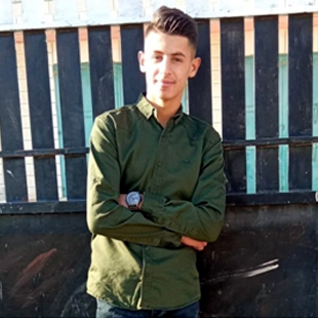 Shawkat Kamal Shawkat Abed, 17, succumbed to his injuries on April 15 after Israeli forces shot him in the abdomen near Jenin. Israeli forces shot and killed Qusai Fuad Mohammad Hamamra, 16, in Husan, near Bethlehem on April 13. Mohammad Hussein Mohammad Qassim succumbed to his wounds on April 11, a day after Israeli forces shot him in Jenin. Israeli forces shot and killed Sanad Mohammad Khalil Abu Atiya on March 31 in Jenin as he approached a wounded man in an attempt to render aid. Nader Haitham Fathi Rayyan, 16, was killed by Israeli forces outside the entrance of Balata refugee camp located southeast of Nablus on March 15. Israeli forces shot and killed Yamen Nafez Mahmoud Khanafseh in Abu Dis, east of Jerusalem on March 6. Israeli forces shot and killed 13-year-old Mohammad Rezq Shehadeh Salah on February 22 in Al-Khader, southwest of Bethlehem. An Israeli sniper shot and killed 16-year-old Mohammad Akram Ali Taher Abu Salah with live ammunition on February 13 while Israeli forces deployed in the village of Silat Al-Harithiya near Jenin in the northern occupied West Bank, according to documentation collected by DCIP. Shawkat Kamal Shawkat Abed, 17, succumbed to his injuries on April 15 after Israeli forces shot him in the abdomen near Jenin. Israeli forces shot and killed Qusai Fuad Mohammad Hamamra, 16, in Husan, near Bethlehem on April 13. Mohammad Hussein Mohammad Qassim succumbed to his wounds on April 11, a day after Israeli forces shot him in Jenin. Israeli forces shot and killed Sanad Mohammad Khalil Abu Atiya on March 31 in Jenin as he approached a wounded man in an attempt to render aid. Nader Haitham Fathi Rayyan, 16, was killed by Israeli forces outside the entrance of Balata refugee camp located southeast of Nablus on March 15. Israeli forces shot and killed Yamen Nafez Mahmoud Khanafseh in Abu Dis, east of Jerusalem on March 6. Israeli forces shot and killed 13-year-old Mohammad Rezq Shehadeh Salah on February 22 in Al-Khader, southwest of Bethlehem. An Israeli sniper shot and killed 16-year-old Mohammad Akram Ali Taher Abu Salah with live ammunition on February 13 while Israeli forces deployed in the village of Silat Al-Harithiya near Jenin in the northern occupied West Bank, according to documentation collected by DCIP.
|
| |
| WABA celebrates Mother's day and applauds every mothers' breastfeeding journey. |
| |
Breastfeeding is a special bond shared between the mother and child that comes with many health and economic benefits, both in the short- and long-term. Breast milk is the first food and provides food security for 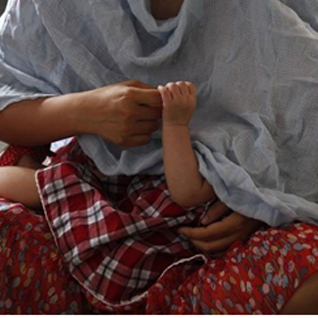 babies. Breastfeeding is sustainable, ecological, and good for humanity. It also contributes to the fight against climate change and environmental degradation. Breastfeeding provides life-long benefits to both mothers and babies. Unfortunately, the pandemic has disrupted breastfeeding support both in the healthcare system and community. With ongoing efforts to manage the pandemic and transition to an endemic state, there is an urgent need to rely on evidence-based information to make policies and create efficient breastfeeding support systems to help new mothers breastfeed. babies. Breastfeeding is sustainable, ecological, and good for humanity. It also contributes to the fight against climate change and environmental degradation. Breastfeeding provides life-long benefits to both mothers and babies. Unfortunately, the pandemic has disrupted breastfeeding support both in the healthcare system and community. With ongoing efforts to manage the pandemic and transition to an endemic state, there is an urgent need to rely on evidence-based information to make policies and create efficient breastfeeding support systems to help new mothers breastfeed.
Breastfeeding is a matter of human rights for both mother and child. Relevant international human rights treaties emphasize the need to provide all necessary support and protection to mothers and their infants to facilitate optimal feeding practices. Breastfeeding is not just a woman's issue or the sole responsibility of a woman. The protection, promotion and support of breastfeeding concern all of society and require a team effort. |
|
|
|
|
|
|
|
| |
| |
| |
Our mailing address is: |
Follow SPARC on social media |
| |
House # 98, Street # 05, MPCHS, E-11/1, Islamabad
info@sparcpk.org | Tel # 051-2163011 |
|
|
|
|
|
| |
|